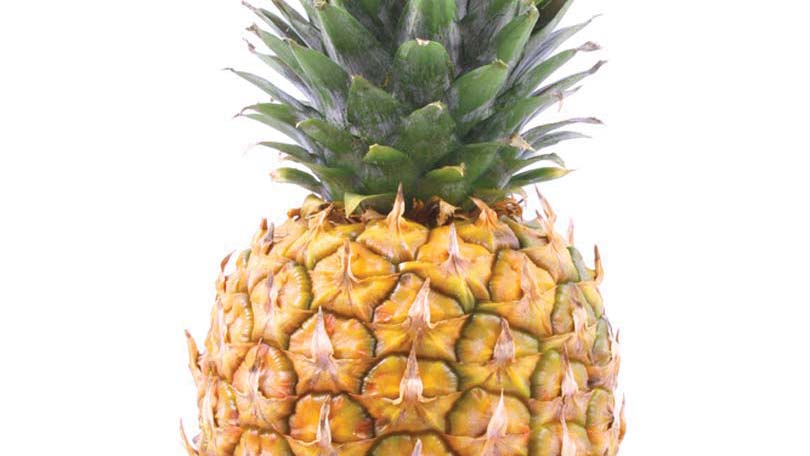
Despite its longstanding public image as a Hawaiian fruit, the pineapple actually hails from South America. It did not take root in the islands until the 1790, when Captain James Cook brought it to Hawaii long after Spanish and Portugese explorers had transplanted them throughout Europe and other parts of the world.
These days, China is the world’s leading pineapple producer; although Hawaii holds the lion’s share of the market in the United States, that constitutes only 10 percent of the world market. (Florida also produces pineapples, but not enough to be considered a market leader.)
Named for its visual similarity to the pinecone, pineapple is available year-round, but its peak season is from March to July.
When shopping for pineapple, look for signs of freshness such as intensely green leaves, a pleasingly tropical smell, and firm flesh with no spots or mushiness. The eyes (the “thorns” scattered on the pineapple’s body) should not be dark or watery. The pineapple should be plump and heavy for its size.
Pineapples must be picked when fully ripened, so transportation is a huge issue. Now that they can be transported via air, their quality in mainland grocery stores has improved tremendously.
Their lack of starch means that pineapples will not ripen after they have been picked, so checking for ripeness is as important as checking for freshness. A ripe pineapple will have yellow breaking through its base, indicating that its natural sugar has sweetened the fruit.
Refrigerate whole ripe pineapples in a plastic bag. They will keep fresh for three to five days. Cut pineapple should also be refrigerated and tightly wrapped, but it will stay fresh for only a day or two. Pineapple can be frozen (after cubed and stored in an airtight container with its juices) for up to six months.
To prepare a pineapple for eating, use a sharp knife to trim the top and bottom down to the flesh. Next, hold the pineapple upright and slice off its skin in a downward vertical motion, slicing deeply enough to remove its eyes. The final step is to remove the center core. You can do this by slicing the pineapple into discs and then coring the cross-section, or you can slice the pineapple lengthwise around the core. You may want to prepare the pineapple on a plate so that you can capture all of the juices as you slice.
Serve pineapple as slices, wedges, strips, or cubes. You can plan ahead to hollow the pineapple shell and use it as a bowl for tropical fruit salad. The beauty of the pineapple makes it a lovely centerpiece.
Canned pineapple is especially useful in recipes. It is available in sugar syrup or natural juices, and comes crushed or in slices, strips, or chunks. You can store unopened canned pineapple up to one year in your pantry, but you should refrigerate and use it within one week after the can has been opened.
Fresh pineapple contains bromelain, an enzyme which will prevent gelatin from setting and will cause dairy products to curdle. (You can use fresh pineapple with dairy if you do not combine them until immediately prior to serving.) The enzyme resembles gastric acids, so it also serves as a valuable aid in digestion. Bromelain’s chemical properties and pineapple’s sweet flavor combine to create a wonderful marinade and meat tenderizer.
Here is a recipe for a rich, delicious dessert whose buttery goodness makes it the ideal comfort food.
Pineapple Upside-Down Cake
Topping:
¼ cup butter, melted
2/3 cup light brown sugar, firmly packed
1 can (approximately 1 pound) pineapple in its own juice
Cake:
1 ½ cups all-purpose flour
1 ½ teaspoons baking powder
½ teaspoon salt
½ teaspoon cinnamon
½ cup butter, softened
2/3 cup granulated sugar
2 eggs
1 teaspoon vanilla
½ cup milk
Preheat oven to 350 degrees.
Butter a 9” round cake pan.
Drain pineapple, reserving juice. Set aside.
Mix the ¼ cup melted butter and brown sugar, then spread it evenly in the pan.
Distribute the pineapple evenly atop the brown sugar topping. (Crushed pineapple or tidbits work especially well, but sliced or chunks are also good.)
Set aside.
In large bowl, sift together flour, baking powder, salt, and cinnamon.
In another bowl, cream the ½ cup butter with granulated sugar and beat with electric mixer until fluffy.
Add eggs, beating well after each addition.
Add vanilla and reserved pineapple juice, mixing well.
Add the flour mixture and milk, alternating each in small batches and beating well after each addition.
Pour batter into pan, spreading evenly over pineapple and topping.
Bake at 350 degrees for 45 minutes or until a skewer tests clean.
Cool upright on a wire rack for 15 minutes.
Run knife around edge, then invert on serving platter.
Cake is delicious warm or at room temperature as is or with whipped cream or ice cream.





